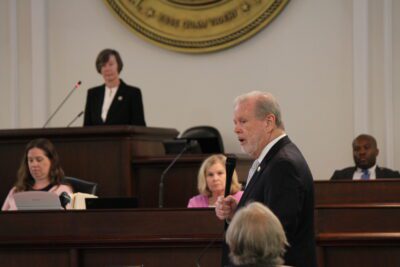
In an era when public education should be a beacon of fairness and intellectual freedom, North Carolina stands poised to take a bold step forward.
This bill, “Eliminating ‘DEI’ in Public Education,” aims to ensure that every student, teacher, and school employee is treated with dignity and respect while upholding the principles of equal opportunity and intellectual inquiry. This legislation is not about stifling diversity or ignoring history; rather, it is about reinforcing the core American values of fairness, merit, and the right to independent thought.
At its heart, this bill reflects the foundational belief enshrined in our state and national constitutions: all individuals are created equal. Unfortunately, in recent years, certain educational initiatives have strayed from this principle, promoting concepts that divide rather than unite. The bill appropriately targets “divisive concepts” that force students, teachers, or school employees to view themselves and others primarily through the lens of race or sex, rather than as unique individuals with inherent dignity and potential.
It is important to clarify what the bill does not do:
- It is not a ban on teaching history or discussing past injustices. The bill explicitly allows impartial discussions of historical events, oppression, and ethnic history as part of the NC Standard Course of Study. Students will continue to learn about pivotal moments such as the Civil Rights Movement, the suffrage movement, and other struggles for equality. The difference is that these topics will be presented in a way that fosters understanding rather than division.
- It is not a restriction on free speech. The bill makes clear that it does not limit protected speech. Educators and students alike will remain free to express their perspectives and engage in open discussion.
- It is not a prohibition on individual research or study. Students and teachers will still have access to materials discussing diversity, equity, and inclusion concepts for research or independent study. Academic exploration and inquiry remain fundamental to education.
- It does not eliminate all forms of professional development. The bill only prohibits mandatory professional development that advocates for divisive concepts or discriminatory practices. Teachers will still have access to valuable training opportunities, but they will not be required to affirm ideological viewpoints as a condition of employment.
- It does not ban discussions about diversity, equity, and inclusion entirely. While the bill prevents institutionalized DEI offices and programs that push divisive frameworks, it does not stop students and teachers from discussing these topics in the classroom or engaging in thoughtful debate within the boundaries set by law.
- It does not prevent compliance with state or federal law. If a policy, procedure, or training is mandated by federal or state law, it remains in place. This bill does not override legal requirements designed to ensure equality and fairness.
One of the bill’s most important provisions ensures that students will not be compelled to affirm or believe in ideas that suggest any race or sex is inherently superior or that individuals should bear collective guilt for historical actions. Such teachings distort historical understanding and impose narratives that divide rather than unite. Instead of fostering unity, they create a framework where some individuals are labeled as perpetual oppressors while others are considered perpetual victims. This does a disservice to everyone, particularly young minds striving to forge their own paths.
This legislation also safeguards academic freedom and open inquiry. Some have falsely suggested that eliminating DEI offices and initiatives will curtail discussions on race, sex, and history. The reality is quite the opposite. The bill explicitly states that historical topics, including those related to racial and ethnic history, should be taught in an objective manner. The goal is to encourage critical thinking rather than ideological indoctrination.
Additionally, this legislation upholds the rights of teachers by preventing them from being forced to attend professional development sessions that promote divisive ideologies. Too often, educators are subjected to mandatory training that contradicts their personal beliefs and professional judgment. The bill affirms that teachers should not be compelled to endorse political or ideological viewpoints simply to keep their jobs or to avoid being ostracized.
Beyond the philosophical merits, this bill also has practical benefits. By eliminating DEI bureaucracies that often siphon financial resources away from classrooms, we can redirect funding toward initiatives that enhance student learning. Hiring more teachers, improving instructional materials, and investing in technology will have a far greater impact on student success than redundant administrative offices and funding that pushes ideological agendas.
Ultimately, this legislation is about fairness. It ensures that public schools remain places of learning, inquiry, and mutual respect rather than battlegrounds for political and ideological struggles. Every North Carolinian, regardless of background, should support an education system that prioritizes excellence, equal opportunity, and the free exchange of ideas.
Our schools should be shaping the next generation of leaders, thinkers, and innovators — not burdening students with ideological constraints that limit their ability to engage critically with the world around them. This bill is a necessary step toward restoring balance in education, reinforcing core American values, and preparing our students for a future defined by their abilities and efforts, not by imposed ideological narratives.
North Carolina has the opportunity to lead by example, ensuring that education remains a pathway to knowledge and success for all. This bill deserves the full support of lawmakers and the public alike.
The future of our students — and the integrity of our educational system –depends on it.
Recommended reading

